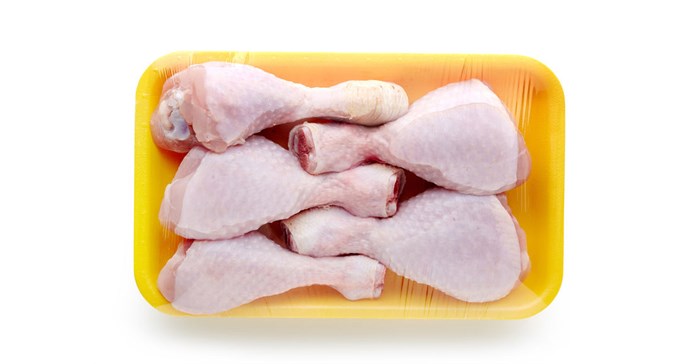Major chicken producer RCL Foods, which owns the Rainbow and Farmer Brown chicken brands, says the government's new 13.9% safeguard duty on imported bone-in chicken portions from the EU is "hopelessly inadequate."
South African chicken producers, the South African Poultry Association, and labour mainly blame "dumping" of dark chicken meat products, such as legs, for the industry's woes as producers struggle to sustain operations.
Scott Pitman, MD of the consumer division at RCL, says 1,355 workers, staff and management will lose jobs at the end of January. This is because exports of dumped chicken leg quarters are in great oversupply globally.
"Northern hemisphere consumers, who consume most of the chicken meat in the world, only desire breast meat and wings, and therefore the leg quarters are in oversupply - and Africa is one of the few places they can still sell it," he says. "But because of the oversupply they must lower their prices by whatever new tariff is imposed, otherwise they won't sell it. Hence the uselessness of the 13.9% new EU tariff," he says.
Government aware of crisis
Trade and Industry Minister, Rob Davies, who in December increased tariffs on imported chicken portions, says the government is aware of the crisis facing the poultry industry and is considering designating chicken as one of the products that state entities will be required to buy locally.
The deputy director-general of the industrial development division of the Department of Trade and Industry, Garth Strachan, says the department has assembled a task team of experts to assess the depth of the crisis and its effect on the poultry industry.
Policy instruments that could be deployed to support the industry and protect jobs would also ensure that the interests of consumers are safeguarded. "A meeting between government - representative of a number of departments - business and labour will be convened in the very near future to share and discuss this," Strachan says.
Raising aggregate demand for domestically produced chicken is a key policy objective, he says. "Engagement with public sector procuring agencies has already taken place to ensure that the relevant clauses of the Public Finance Management Act are utilised to procure locally produced poultry and poultry products," he says.
A call for hefty tariffs, similar phytosanitary barriers as the rest of the world
The Food and Allied Workers Union (Fawu) has also criticised the Department of Trade and Industry over the new safeguard duty. It is not enough to stop thousands of workers in the industry from losing their jobs, it says.
The losses are a result of the "dumping" of chicken parts by the US, Brazil, and the EU, Fawu general secretary Katishi Masemola says. The government has to impose "hefty tariffs on these chicken pieces."
"We were calling for tariffs of up to 40%, but the government has recently announced that it will impose a tariff of a low 13.9% and this would definitely not deter the dumping of chicken pieces in our market," Masemola says.
Pitman says that SA is "almost unique in the world" in not protecting its domestic poultry market. The country needs to impose similar phytosanitary barriers to those of the rest of the world.
"The EU says that because our ostriches in the Eastern Cape have occasional avian flu, they will ban all chicken exports from SA, despite the fact that our chickens have never had avian flu. In the US they say the same. South America says 'we don't approve of your abattoirs' - although we have world-class abattoirs," Pitman says.
We can't compete with unfair trade
Kevin Lovell, CEO of the South African Poultry Association, says that the "crisis" in SA's domestic poultry industry is caused by the dumping of dark, or brown, chicken meat products.
"We can't compete with unfair trade - that's the issue," he says. SA can compete with the EU on the import of whole chickens, but not "against leftovers and waste which is dumped", he says.
The EU and US models for accounting for the added costs of cutting chicken into pieces have no basis in reality, Lovell says. "It's called Enron accounting. It's creative accounting."
The EU, US, and Brazil have different forms of subsidy for their chicken industries - "not all of them impermissible" - while SA has none. To this end, SA's chicken producers pay more for yellow maize and soya-based poultry feeds than competitor nations, whether there is drought or not. A national crop insurance scheme may ease competitive pressures, but it is costly and complicated, Lovell says.
Unaffordable and devastating political and economic policies
Meanwhile, independent agricultural economist Fanie Brink says the biggest threat to agriculture is the government's "unaffordable and devastating political and economic policies".
"These are largely responsible for virtually no economic growth over the past year, an eventual inevitable downgrading of the sovereign and credit rating of the country, unprecedented mismanagement of taxpayers' money, an unsuccessful land reform policy and rampant corruption," he says.
Commercial agriculture has not received any drought aid after the worst drought in decades. "The government clearly turned its back on agriculture in 2016, not only as far as the commercial production of food was concerned, but also with regard to the development and establishment of emerging farmers," Brink says.
With Nce Mkhize
Source: Business Day






































